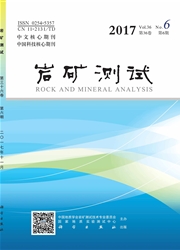

 中文摘要:
中文摘要:
传统上认为大分子烃类很难通过微渗漏方式逸散到地表,但已有研究表明高分子量烃类也可以逸散到现代沉积物中。本文基于黄海现代沉积物与典型原油地球化学特征的不同,将二者进行正交配比,系统研究不同配比产物的组成特征。结果表明:随着配比实验中原油比例的增大,正构烷烃和部分芳烃的色谱指纹呈现规律性变化,其正构烷烃奇偶优势逐渐消失,烷基芳烃丰度随之增加;三环萜烷、藿烷、规则甾烷等化合物的绝对浓度,以及二苯并噻吩/菲等的比值也呈现规律性变化,其中三环帖烷、C24四环萜烷/C26三环萜烷和三环萜彬藿烷三者的变化明显且平稳,其数值范围均在0~3.0,适合用于渗逸图版。将研究区采集的未知样品与配比产物的组成特征进行对比,在排除外源污染的情况下可定性判识该研究区是否存在地下油气藏;将样品的相关参数投到图版上,有望进一步定量判识样品中渗入原油的比例。该方法可以作为常规油气化探的补充,在油气藏评价方面提供诸多信息,甚至在环境污染监控等领域有望获得推广。
 英文摘要:
英文摘要:
Although traditionally it is very difficult for high molecular weight hydrocarbons micro-leaking to the surface, existing research shows that high molecular weight hydrocarbons can seep to modern surface sediments. Based on their different geochemical characteristics, modern sediments of the Yellow Sea and typical crude oil have been matched with different ratios to study the composition of each product. Results show that with the increasing proportion of oil in the matching test, the chromatographic fingerprint of n-alkanes and part of aromatic hydrocarbons show regular changes. The OEP of the n-alkanes disappear gradually and the abundance of alkyl aromatic hydrocarbons increases. The absolute concentration of the compounds, such as Tricyclic terpane, hopanes, regular steranes, and ratio of dibenzothiophene versus phenanthrene also show regular changes. Tricyclic terpane, ratio of C24 tetracyclic terpane alkyl/Cz6 tricyclic terpane and ratio of ricyclic terpanes/hopane change smoothly and obviously with a range of 0 - 3.0, suitable for building a leakage plate. In the case of excluding external pollution, comparison of unknown samples collected in the study area with the matched mixture can determine whether there is an oil and gas reservoir. Plotting the same indices of the unknown samples on the plate would further quantitatively identify the proportion of crude oil in the sediment sample. This method can be used as a supplement to conventional exploration for oil and gas and can give much more information about reservoir evaluation. This method can alsobe extended to the field of environmental pollution monitoring.
 同期刊论文项目
同期刊论文项目
 同项目期刊论文
同项目期刊论文
 期刊信息
期刊信息
